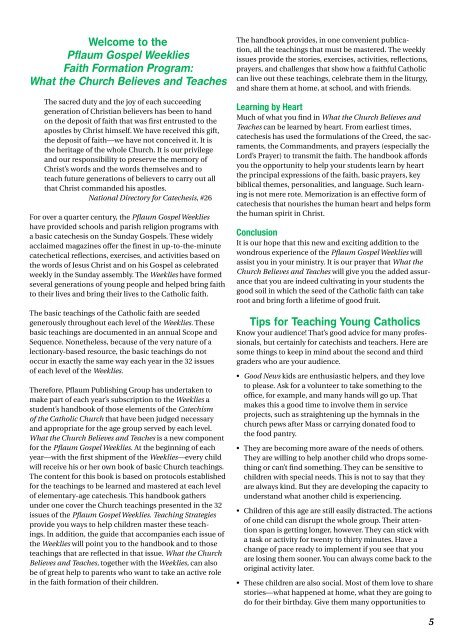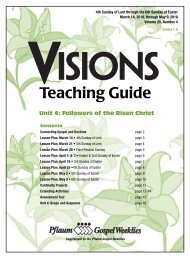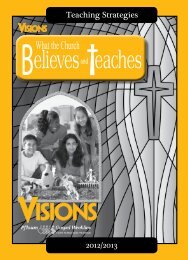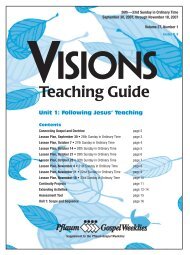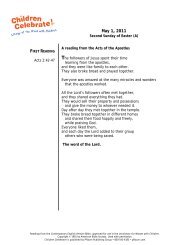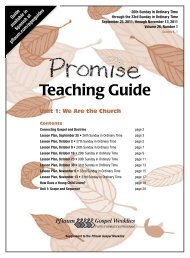Good News - Pflaum Gospel Weeklies
Good News - Pflaum Gospel Weeklies
Good News - Pflaum Gospel Weeklies
Create successful ePaper yourself
Turn your PDF publications into a flip-book with our unique Google optimized e-Paper software.
Welcome to the<br />
<strong>Pflaum</strong> <strong>Gospel</strong> <strong>Weeklies</strong><br />
Faith Formation Program:<br />
What the Church Believes and Teaches<br />
The sacred duty and the joy of each succeeding<br />
generation of Christian believers has been to hand<br />
on the deposit of faith that was first entrusted to the<br />
apostles by Christ himself. We have received this gift,<br />
the deposit of faith—we have not conceived it. It is<br />
the heritage of the whole Church. It is our privilege<br />
and our responsibility to preserve the memory of<br />
Christ’s words and the words themselves and to<br />
teach future generations of believers to carry out all<br />
that Christ commanded his apostles.<br />
National Directory for Catechesis, #26<br />
For over a quarter century, the <strong>Pflaum</strong> <strong>Gospel</strong> <strong>Weeklies</strong><br />
have provided schools and parish religion programs with<br />
a basic catechesis on the Sunday <strong>Gospel</strong>s. These widely<br />
acclaimed magazines offer the finest in up-to-the-minute<br />
catechetical reflections, exercises, and activities based on<br />
the words of Jesus Christ and on his <strong>Gospel</strong> as celebrated<br />
weekly in the Sunday assembly. The <strong>Weeklies</strong> have formed<br />
several generations of young people and helped bring faith<br />
to their lives and bring their lives to the Catholic faith.<br />
The basic teachings of the Catholic faith are seeded<br />
generously throughout each level of the <strong>Weeklies</strong>. These<br />
basic teachings are documented in an annual Scope and<br />
Sequence. Nonetheless, because of the very nature of a<br />
lectionary-based resource, the basic teachings do not<br />
occur in exactly the same way each year in the 32 issues<br />
of each level of the <strong>Weeklies</strong>.<br />
Therefore, <strong>Pflaum</strong> Publishing Group has undertaken to<br />
make part of each year’s subscription to the <strong>Weeklies</strong> a<br />
student’s handbook of those elements of the Catechism<br />
of the Catholic Church that have been judged necessary<br />
and appropriate for the age group served by each level.<br />
What the Church Believes and Teaches is a new component<br />
for the <strong>Pflaum</strong> <strong>Gospel</strong> <strong>Weeklies</strong>. At the beginning of each<br />
year—with the first shipment of the <strong>Weeklies</strong>—every child<br />
will receive his or her own book of basic Church teachings.<br />
The content for this book is based on protocols established<br />
for the teachings to be learned and mastered at each level<br />
of elementary-age catechesis. This handbook gathers<br />
under one cover the Church teachings presented in the 32<br />
issues of the <strong>Pflaum</strong> <strong>Gospel</strong> <strong>Weeklies</strong>. Teaching Strategies<br />
provide you ways to help children master these teachings.<br />
In addition, the guide that accompanies each issue of<br />
the <strong>Weeklies</strong> will point you to the handbook and to those<br />
teachings that are reflected in that issue. What the Church<br />
Believes and Teaches, together with the <strong>Weeklies</strong>, can also<br />
be of great help to parents who want to take an active role<br />
in the faith formation of their children.<br />
The handbook provides, in one convenient publication,<br />
all the teachings that must be mastered. The weekly<br />
issues provide the stories, exercises, activities, reflections,<br />
prayers, and challenges that show how a faithful Catholic<br />
can live out these teachings, celebrate them in the liturgy,<br />
and share them at home, at school, and with friends.<br />
Learning by Heart<br />
Much of what you find in What the Church Believes and<br />
Teaches can be learned by heart. From earliest times,<br />
catechesis has used the formulations of the Creed, the sacraments,<br />
the Commandments, and prayers (especially the<br />
Lord’s Prayer) to transmit the faith. The handbook affords<br />
you the opportunity to help your students learn by heart<br />
the principal expressions of the faith, basic prayers, key<br />
biblical themes, personalities, and language. Such learning<br />
is not mere rote. Memorization is an effective form of<br />
catechesis that nourishes the human heart and helps form<br />
the human spirit in Christ.<br />
Conclusion<br />
It is our hope that this new and exciting addition to the<br />
wondrous experience of the <strong>Pflaum</strong> <strong>Gospel</strong> <strong>Weeklies</strong> will<br />
assist you in your ministry. It is our prayer that What the<br />
Church Believes and Teaches will give you the added assurance<br />
that you are indeed cultivating in your students the<br />
good soil in which the seed of the Catholic faith can take<br />
root and bring forth a lifetime of good fruit.<br />
Tips for Teaching Young Catholics<br />
Know your audience! That’s good advice for many professionals,<br />
but certainly for catechists and teachers. Here are<br />
some things to keep in mind about the second and third<br />
graders who are your audience.<br />
• <strong>Good</strong> <strong>News</strong> kids are enthusiastic helpers, and they love<br />
to please. Ask for a volunteer to take something to the<br />
office, for example, and many hands will go up. That<br />
makes this a good time to involve them in service<br />
projects, such as straightening up the hymnals in the<br />
church pews after Mass or carrying donated food to<br />
the food pantry.<br />
• They are becoming more aware of the needs of others.<br />
They are willing to help another child who drops something<br />
or can’t find something. They can be sensitive to<br />
children with special needs. This is not to say that they<br />
are always kind. But they are developing the capacity to<br />
understand what another child is experiencing.<br />
• Children of this age are still easily distracted. The actions<br />
of one child can disrupt the whole group. Their attention<br />
span is getting longer, however. They can stick with<br />
a task or activity for twenty to thirty minutes. Have a<br />
change of pace ready to implement if you see that you<br />
are losing them sooner. You can always come back to the<br />
original activity later.<br />
• These children are also social. Most of them love to share<br />
stories—what happened at home, what they are going to<br />
do for their birthday. Give them many opportunities to<br />
5


